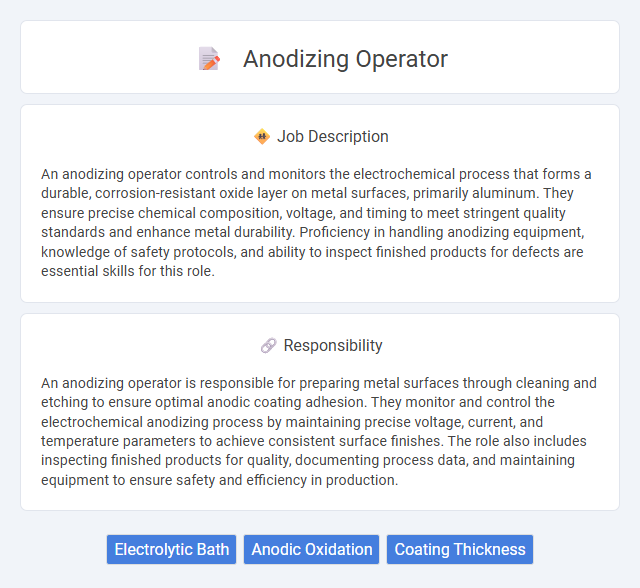
An anodizing operator controls and monitors the electrochemical process that forms a durable, corrosion-resistant oxide layer on metal surfaces, primarily aluminum. They ensure precise chemical composition, voltage, and timing to meet stringent quality standards and enhance metal durability. Proficiency in handling anodizing equipment, knowledge of safety protocols, and ability to inspect finished products for defects are essential skills for this role.
Individuals with strong attention to detail and good manual dexterity are likely suitable for an anodizing operator job, as it involves precise handling of metal parts and chemical processes. Candidates who can tolerate working in environments with fumes and strict safety protocols may have a higher probability of success in this role. Those with respiratory issues or sensitivity to chemicals might find the conditions challenging and may not be ideal for this position.
Qualification
An Anodizing Operator must possess a high school diploma or equivalent, with specialized training in metal finishing processes preferred. Proficiency in handling anodizing equipment, understanding chemical bath formulations, and adherence to safety protocols are essential qualifications. Strong attention to detail and the ability to maintain precise control over voltage, temperature, and timing parameters ensure high-quality oxide coatings.
Responsibility
An anodizing operator is responsible for preparing metal surfaces through cleaning and etching to ensure optimal anodic coating adhesion. They monitor and control the electrochemical anodizing process by maintaining precise voltage, current, and temperature parameters to achieve consistent surface finishes. The role also includes inspecting finished products for quality, documenting process data, and maintaining equipment to ensure safety and efficiency in production.
Benefit
Anodizing operator positions likely offer benefits such as enhanced job stability due to the specialized skill set required for metal finishing processes. Employees may experience improved health and safety standards, reducing workplace hazards through controlled chemical treatments. Opportunities for career advancement and technical training could also increase, fostering professional growth within manufacturing and industrial sectors.
Challenge
Working as an anodizing operator likely involves managing the challenge of maintaining precise control over chemical bath conditions to ensure consistent coating quality. The role probably demands careful attention to detail and strong problem-solving skills to address variations in metal surfaces and unexpected equipment fluctuations. Operators may frequently encounter the need to troubleshoot process inconsistencies while adhering to strict safety and environmental protocols.
Career Advancement
Anodizing operators gain specialized expertise in metal finishing technologies, enabling career growth into supervisory or quality control roles within manufacturing plants. Mastery of process parameters and equipment maintenance enhances job performance, opening pathways to advanced positions such as production manager or materials engineer. Continuous training in industry standards and safety regulations supports long-term professional development and increased earning potential.
Key Terms
Electrolytic Bath
An Anodizing operator manages the electrolytic bath process to enhance metal surfaces, primarily aluminum, by creating a corrosion-resistant oxide layer. Precise control of bath temperature, voltage, and electrolyte concentration ensures optimal coating thickness and uniformity. Experienced operators monitor equipment performance and conduct routine maintenance to maintain bath chemistry and efficiency.
Anodic Oxidation
An anodizing operator specializes in overseeing the anodic oxidation process, which enhances metal surfaces by creating a durable, corrosion-resistant oxide layer primarily on aluminum. The role involves controlling electrolyte agitation, voltage, and timing parameters to ensure precise oxide film thickness and uniformity. Mastery of chemical handling, safety protocols, and quality inspection with tools such as thickness gauges is essential to achieve optimal surface treatments in manufacturing environments.
Coating Thickness
Anodizing operators specialize in applying precise aluminum oxide coatings to metal surfaces, ensuring optimal corrosion resistance and enhanced durability. They meticulously monitor coating thickness using advanced measurement tools, typically targeting a range of 10 to 25 microns depending on industry specifications. Maintaining consistent anodic film thickness is critical for meeting quality standards and achieving superior surface performance in aerospace, automotive, and electronics sectors.
 kuljobs.com
kuljobs.com